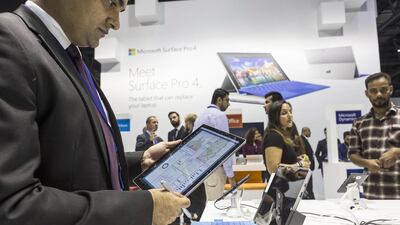Notebooks and tablets are converging into a single product. To compete with tablets, notebooks are getting slimmer, smaller and lighter, while tablets are getting bigger and more powerful to compete with the notebooks. A growing number of tablets come with an option for a separate keyboard.
Previously, there was a clear distinction between the tasks performed by PCs and tablets – the former designed for content creation and the latter for content consumption. This distinction is diminishing, with newer products encroaching on the other’s space. The emergence of detachable tablets, convertible PCs and ultraslim PCs provides examples of this convergence.
The “miniaturisation” of devices in terms of reducing thickness and overall size is a clear area of focus for vendors, with new PCs and tablets routinely slimmer and lighter than the devices they have replaced. But are these enhancements compelling enough for users to upgrade without a dire need to do so? The latest sales figures suggest the answer to that question is a resounding “No”.
IDC’s research shows that PC shipments in the Middle East and Africa declined by 22.8 per cent year-on-year, last year, while tablet sales declined by 3.1 per cent over the same period. The challenging economic environment brought about by low oil prices and the strong dollar has elongated the replacement cycles for these devices, particularly as PCs and tablets tend not be viewed as necessities or status symbols like their smartphone cousins.
Miniaturisation, in terms of thickness, cannot go on forever and vendors need to work on other parameters to provide compelling reasons for people to update their devices. There needs to be a differentiation between the offerings that is meaningful, otherwise the free fall will continue. So which other aspects should become a target for innovation?
Battery life has long been a weak link in the consumer technology space. IDC’s ConsumerScape 360 research shows that battery life is one of the most important purchase drivers when it comes to smartphones, while it also features in the top three for tablets and phablets. One cannot negate the importance of battery life in a PC either. Imagine if you only had to charge your devices once a week or even once a month – that would certainly present a compelling reason to make a new purchase, so innovation that centres on faster charging, wireless charging and extended battery life should be a clear area of focus.
Meanwhile, PCs will remain key for storing and analysing the information that is collected from the array of other gadgets that consumers typically own – including smartphones, wearables, home appliances, cars and so on, all of which will be connected to each other via the Internet of Things. Analysis of this data is essential to moving us towards a smarter world and while smartphones might be best suited to accessing the array of devices in question, the role of the PC is actually far more important. This is because the PC will work as a secure storage device through which detailed settings of the other devices can be changed.
As such, the provision of a safe and convenient interface through which users can seamlessly interact with their other devices would greatly enhance the user experience. This represents another area where greater innovation efforts should be focused. The “user experience” will become the key to driving sales of gadgets in the future, and there will be a pressing need for an “ecosystem for gadgets” to be created to make the experience better.
When we consider the impact that innovation can have, it is important to look at the market from two perspectives. The first aspect centres on making the meaningful innovation itself, while the second centres on making the consumer realise that there actually is an incremental difference between the products being offered. This second aspect is critical and will hold the key to driving growth, particularly in the immediate aftermath of a new product launch.
Many consumers remain unaware of the added benefits that come with new devices featuring the latest software, choosing instead to hold on to their old devices as they have become blissfully used to the relatively poor user experience. Given this reality, there is an increasing need to make users aware of the capabilities of new devices and allow them to experience the difference by trying the new products out for themselves.
In this regard, the establishment of “user experience stores” in high-footfall areas would be a step in the right direction. Currently, the core focus of a supermarket or electronics store centres on the sale of products, but the need of the hour is to let the consumer experience the device and truly realise the difference that is being offered. Once that has been achieved, sales are likely to follow – if not immediately, then over a longer period of time.
Microsoft’s “PC does what?” campaign, in association with Intel, HP, Dell and Lenovo, was an attempt to get people who have older PCs to be aware of the improved capabilities of newer-generation PCs. More of these campaigns should be targeted at consumers around the world to shake them up and make them realise that one should not be content with their current user experience.
With declining sales, marketing budgets are inevitably going to be cut, so it is imperative that vendors choose the right path forward. And as ever, having a clear understanding of what exactly is motivating consumers’ behaviour will make all the difference between success and failure.
Nakul Dogra is the senior research analyst for the Middle East and Africa at IDC.
business@thenational.ae
Follow The National's Business section on Twitter

